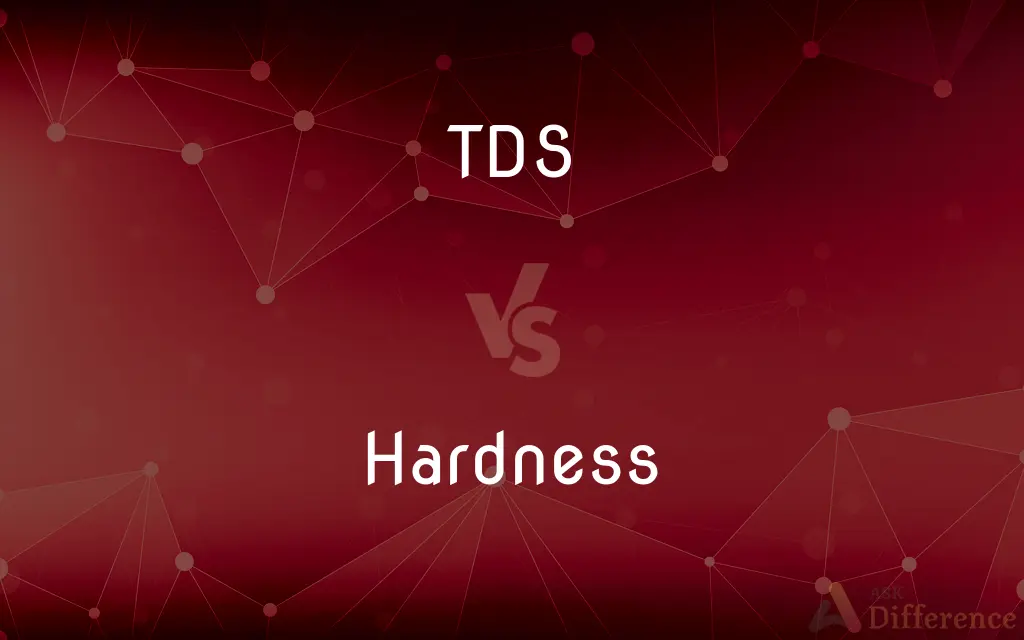TDS vs. Hardness — What's the Difference?
By Tayyaba Rehman — Published on January 17, 2024
TDS (Total Dissolved Solids) refers to all dissolved substances in water, while hardness specifically measures the concentration of calcium and magnesium ions.

Difference Between TDS and Hardness
Table of Contents
ADVERTISEMENT
Key Differences
Total Dissolved Solids (TDS) encompasses all the dissolved substances in water, which can include a wide range of elements and compounds. Hardness, however, is a term that specifically describes the concentration of calcium and magnesium ions in water. Both TDS and hardness affect water quality, but they refer to different aspects.
While TDS includes salts, minerals, and metals dissolved in water, hardness is a subset of TDS that focuses on how those specific ions react with soap and affect scaling in pipes. TDS is a broader measure that can influence the taste, safety, and chemical properties of water, whereas hardness primarily impacts the water's suitability for domestic use and industrial applications.
TDS is measured in parts per million (ppm) and can vary greatly based on the water source. Hardness is often measured in grains per gallon (gpg) or milligrams per liter (mg/L) as calcium carbonate. High TDS can indicate a variety of water quality issues, while high hardness levels mainly cause problems with soap effectiveness and scale buildup.
Regulations and guidelines for TDS and hardness levels in drinking water are set to ensure safety and usability. TDS levels are often used as a general indicator of water quality, while specific hardness levels are prescribed to prevent scaling in plumbing and appliances.
Management strategies for TDS and hardness differ; reverse osmosis or distillation can reduce TDS, while water softeners primarily reduce hardness. Understanding the distinction between TDS and hardness is important for water treatment and ensuring that water meets specific needs.
ADVERTISEMENT
Comparison Chart
Definition
Total amount of dissolved substances in water.
Concentration of calcium and magnesium ions in water.
Measurement Units
Parts per million (ppm) or milligrams per liter (mg/L).
Grains per gallon (gpg) or mg/L as calcium carbonate.
Impact on Water
Affects taste, safety, and chemical balance.
Affects soap's ability to lather and scaling in pipes.
Treatment Methods
Reverse osmosis, distillation, filtration.
Water softeners, ion exchange.
Significance
General indicator of water quality.
Indicates water's suitability for washing and industrial use.
Compare with Definitions
TDS
TDS measures the total concentration of dissolved particles in water.
The TDS level of our tap water is 300 ppm, which is acceptable for drinking.
Hardness
It determines how well soap will lather in water.
We have to use more detergent because the water hardness is high.
TDS
TDS levels affect the taste and aesthetic appeal of water.
Water with low TDS tends to taste better and is clearer.
Hardness
Hardness is a key factor in water suitability for appliances.
To prevent mineral buildup, we installed a water softener due to the hardness.
TDS
It includes organic and inorganic substances, salts, and minerals.
We monitor the TDS to keep track of the mineral content in our aquarium.
Hardness
Hardness is treated primarily by using water softening methods.
After treating for hardness, our water feels much softer on the skin.
TDS
TDS is an indicator of water purity and quality.
The high TDS reading suggests the water may require further treatment.
Hardness
Hardness measures the quantity of calcium and magnesium in water.
The hardness of the water caused scaling in my kettle.
TDS
TDS is critical for the assessment of the overall ionic nature of water.
This spa’s water is soft and has very low TDS levels.
Hardness
The quality or condition of being hard.
Hardness
The relative resistance of a mineral to scratching, as measured by the Mohs scale.
Hardness
The relative resistance of a metal or other material to denting, scratching, or bending.
Hardness
The quality of being hard.
Hardness
An instance of this quality; hardship.
Hardness
(inorganic chemistry) The quantity of calcium carbonate dissolved in water, usually expressed in parts per million (ppm).
Hardness
The resistance to scratching, cutting, indentation or abrasion of a metal or other solid material.
Hardness
(physics) The penetrating ability of electromagnetic radiation, such as x-rays; generally, the shorter the wavelength, the harder and more penetrating the radiation.
Hardness
The measure of resistance to damage of a facility, equipment, installation, or telecommunications infrastructure when subjected to attack.
Hardness
A measure of how hard a material is
The hardness of the material was high.
Hardness
The quality or state of being hard, literally or figuratively.
The habit of authority also had given his manners some peremptory hardness.
Hardness
The cohesion of the particles on the surface of a body, determined by its capacity to scratch another, or be itself scratched; - measured among minerals on a scale of which diamond and talc form the extremes.
Hardness
The peculiar quality exhibited by water which has mineral salts dissolved in it. Such water forms an insoluble compound with soap, and is hence unfit for washing purposes.
Hardness
The property of being rigid and resistant to pressure; not easily scratched; measured on Mohs scale
Hardness
Devoid of passion or feeling
Hardness
The quality of being difficult to do;
He assigned a series of problems of increasing hardness
Hardness
Excessive sternness;
Severity of character
The harshness of his punishment was inhuman
The rigors of boot camp
Hardness
Water hardness can lead to scaling in plumbing and boilers.
Our pipes got clogged due to the extreme hardness of our water supply.
Common Curiosities
Does boiling water reduce TDS?
No, it typically concentrates the TDS as water evaporates.
What does TDS stand for?
Total Dissolved Solids.
Does TDS impact the flavor of water?
Yes, higher TDS levels can affect water's taste.
Why is water hardness a concern in households?
It can affect cleaning efficiency and lead to scale buildup.
Is soft water always low in TDS?
Not necessarily; soft water can still have high TDS from non-hardness constituents.
How is water hardness measured?
Typically in grains per gallon (gpg) or milligrams per liter as calcium carbonate (mg/L CaCO3).
Are all dissolved solids in water included in hardness?
No, only calcium and magnesium contribute to hardness.
Can TDS be visually observed in water?
Not usually; TDS is often too dissolved to be seen without a TDS meter.
Can high TDS affect health?
Yes, if it includes harmful contaminants.
Are TDS and hardness related to water pH?
Not directly; pH is a separate measure of acidity or alkalinity.
Can water be hard but low in TDS?
It's uncommon, as hardness is a significant part of TDS.
What is the primary cause of hardness in water?
Dissolved minerals like calcium and magnesium from the soil and rocks.
What is a good TDS level for drinking water?
The EPA recommends TDS levels below 500 ppm.
Do water softeners reduce TDS?
They do not significantly reduce TDS, as they mainly exchange ions to reduce hardness.
How can I test for water hardness at home?
You can use a water hardness test kit available at many stores.
Share Your Discovery

Next Comparison
SLM of Depreciation vs. WDV Method of DepreciationAuthor Spotlight
Written by
Tayyaba RehmanTayyaba Rehman is a distinguished writer, currently serving as a primary contributor to askdifference.com. As a researcher in semantics and etymology, Tayyaba's passion for the complexity of languages and their distinctions has found a perfect home on the platform. Tayyaba delves into the intricacies of language, distinguishing between commonly confused words and phrases, thereby providing clarity for readers worldwide.













































